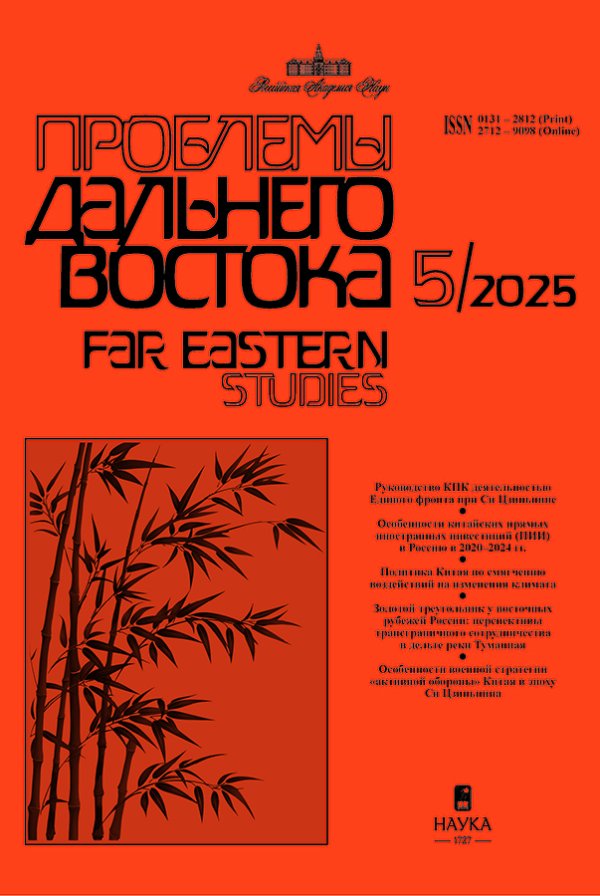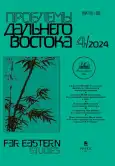Слияние шэньши и купечества в китайской общине Сингапура и их политический прагматизм (1877–1941 гг.)
- Авторы: Чэнь Я.1, Юй Д.2
-
Учреждения:
- Институт истории и культурного наследия, Сямыньский университет
- Институт иностранных языков и культур, Сямыньский университет
- Выпуск: № 4 (2024)
- Страницы: 127-138
- Раздел: История
- URL: https://gynecology.orscience.ru/0131-2812/article/view/676299
- DOI: https://doi.org/10.31857/S0131281224040103
- ID: 676299
Цитировать
Полный текст
Аннотация
В колониальный период (1877–1941) китайские купцы в Сингапуре стремились к статусу шэньши, играли соответствующую роль в обществе и выполняли подобающие социальные функции. В то же время некоторые шэньши стали заниматься торговлей, чтобы обретать, поддерживать и расширять власть и престиж. В рамках традиционной исследовательской парадигмы ученые рассматривали феномен слияния шэньши и купечества с точки зрения национальной, политической и культурной идентичности. Лидеры сингапурских китайцев в рассматриваемый период считали себя патриотами Китая. Но в данной статье по-новому интерпретируются некоторые аспекты деятельности китайской диаспоры в Сингапуре. Авторы исследуют три основных источника власти китайских купцов Сингапура: личные деловые сети и местные тайные общества, китайское правительство и консульство, колониальное правительство. В целях обретения власти купцы использовали пять основных стратегий: расширение культурного влияния на власть, совмещение должностей, активное участие в политической и культурной жизни, политическая лояльность, семейное наследие и брачные союзы. Существовало четыре основных модели организации деятельности китайских купцов: ассоциация носителей какого-либо диалекта, наддиалектная бизнес-ассоциация, ассоциация британских подданных китайского происхождения, политические партии. Их активность подразделялась на четыре вида: благотворительная деятельность, поддержка политических движений, движение за социальные реформы, а также четвертый вид, предполагавший совмещение деятельности по трем первым направлениям. В слиянии шэньши и купцов и их политическом прагматизме (现实主义政治)1 отразились традиционные китайские ценности, социальные и психологические потребности китайского купечества в Сингапуре. Посредством своей экономической, социальной и культурной деятельности данное сословие стремилось как к накоплению, сбережению и приумножению богатства, так и к обретению власти и престижа.
Об авторах
Яо Чэнь
Институт истории и культурного наследия, Сямыньский университет
Email: chenyaoxm@mail.ru
ORCID iD: 0009-0001-5346-6926
Доктор истории, старший преподаватель
КНР, СямыньДаньхун Юй
Институт иностранных языков и культур, Сямыньский университет
Автор, ответственный за переписку.
Email: danhong@mail.ru
ORCID iD: 0000-0002-4604-3650
Доктор филологии, доцент
КНР, СямыньСписок литературы
- Benedict A. Imagined Communities: Reflections on the Origin and Spread of Nationalism, London: Verso, 2016. 256 p.
- Prasenjit Duara. Culture, Power, and the State: Rural North China, 1900–1942. Stanford: Stanford University Press, 1988. 340 p.
- Report of the Committee Appointed to Consider into and take Evidence upon the Condition of Chinese Labour in the Colony. S.S.L.C.P., 1876, Appendix 22.
- Straits Settlements government gazette. Vo. 60. No. 19–31 (Apr. 3 – May 29, 1925). Pp. 664–665.
- Wing Chung Ng. Urban Chinese Social Organization: Some Unexplored Aspects in Huiguan Development in Singapore 1900–1941 // Modern Asian Studies. 1992. Vol. 26 (3). Pp. 469–494. doi: 10.1017/S0026749X00009872
- 《叻报》[Лэ Бао]. 27.10.1887.
- 《叻报》 [Le Bao]. 27.10.1887. (In Chin.)
- 柯木林: 新加坡的 “清明上河图”. Синьцзяпо дэ “Цинмин шанхэ ту” : [Кэ Мулинь. Сингапурская версия «По реке в День поминовения усопших»] // 早报. URL: https://www.zaobao.com.sg/forum/views/opinion/story20160307–589786 (дата обращения: 20.12.2023).
- 柯木林: 新加坡的 “清明上河图” [Ke Mulin. Singaporean version of “Along the River During the Qingming Festival”]. 早报. URL: https://www.zaobao.com.sg/forum/views/opinion/story20160307–589786 (accessed: 20.12.2023). (In Chin.)
- 林孝胜: 新华研究:帮权, 人物, 口述历史. Синь хуа яньцзю: банцюань, жэньу, коушу лиши : [Линь Сяошэн. Исследование китайской общины в Сингапуре: власть бан, личности, устная история]. 新加坡: 新加坡青年书局, 2010年. 462页.
- 林孝胜: 新华研究: 帮权, 人物, 口述历史 [Lin Xiaosheng. Research on the Chinese Community in Singapore: Bang Power, Personalities, Oral History]. 新加坡: 新加坡青年书局, 2010年. 462页. (In Chin.)
- 刘宏: 新加坡中华总商会与亚洲华商网络的制度化. Синьцзяпо Чжунхуа цзуншанхуэй юй Ячжоу хуашан ванло дэ чжидухуа : [Лю Хун. Сингапурская «Китайская торговая палата» и институционализация сети китайских купцов в Азии] // 历史研究. 2000年. 第1期. 第106–118页.
- 刘宏: 新加坡中华总商会与亚洲华商网络的制度化 [Liu Hong. The Singapore Chinese Chamber of Commerce and Industry and the Institutionalization of Chinese Business Networks in Asia]. 历史研究. 2000年. 第1期. 第106–118页. (In Chin.)
- 马敏: “绅商”词义及其内涵的几点讨论. “Шэньшан” цыи цзи ци нэй хань дэ цзидянь таолунь : [Ма Минь. Несколько моментов в дискуссии о смысле и содержании термина «Шэньши-купечество»] // 历史研究. 2001年. 第2期. 第132–138页.
- 马敏: “绅商” 词义及其内涵的几点讨论 [Ma Min. Discussion on the Meaning of the Term Shenshang and Its Connotations]. 历史研究. 2001年. 第2期. 第132–138页. (In Chin.)
- 任娜, 陈衍德: 一个华族社团的结构与功能演变——新加坡福建会馆的历史轨迹. Игэ хуацзу шэтуань дэ цзегоу юй гуннэн яньбянь — Синьцзяпо Фуцзянь хуэйгуань дэ лиши гуйцзи : [Жэнь На, Чэнь Яньдэ. Эволюция функций и структуры одной китайской ассоциации: историческая колея сингапурского «Фуцзяньского землячества»] // 南洋问题研究. 2002年. 第2期. 第47–57页.
- 任娜, 陈衍德: 一个华族社团的结构与功能演变——新加坡福建会馆的历史轨迹 [Ren Na, Chen Yande. Transformation of the Structure and Functions of One Ethnic Chinese Association: Tracing the History of Singapore Hokkien Huay Kuan]. 南洋问题研究. 2002年. 第2期. 第47–57页. (In Chin.)
- 颜清湟: 从历史角度看海外华人社会变革. Цун лиши цзяоду кань хайвай хуажэнь шэхуэй бяньгэ : [Янь Цинхуан. Изменения зарубежных китайских обществ в исторической перспективе]. 新加坡: 新加坡青年书局, 2007年. 504页.
- 颜清湟: 海外华人世界: 族群、人物与政治 [Yan Qinghuang. The World of the Overseas Chinese: Ethnicity, Personalities, and Politics]. 新加坡: 新加坡八方文化创作室, 2017年. 260页. (In Chin.)
Дополнительные файлы








